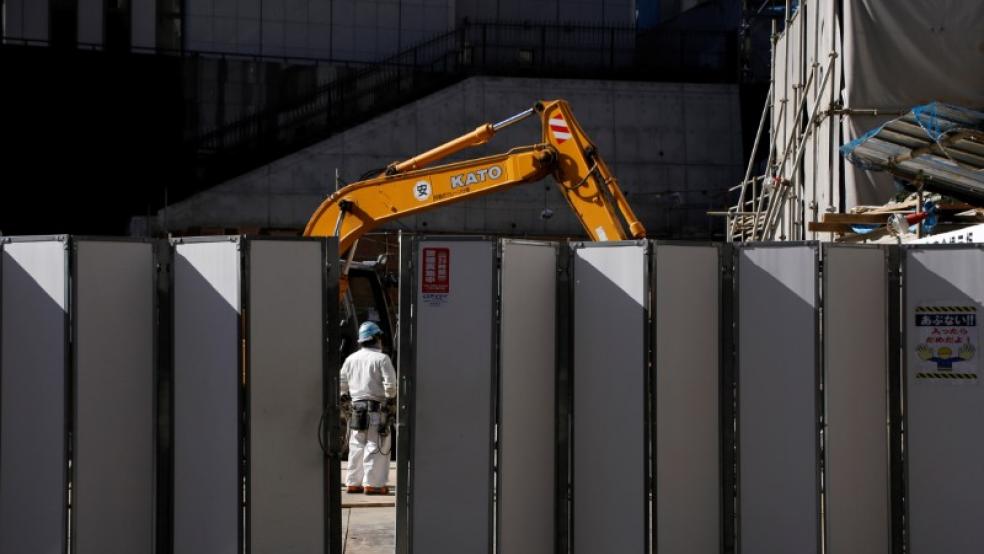TOKYO (Reuters) - Japanese orders for machinery surged to their highest level in a decade in November, in a sign businesses may finally be responding to policymakers' efforts to get companies to spend their massive cash piles to spur economic growth.
The key measure of capital expenditure was issued just as Japan's top business lobby urged companies to raise wages by 3 percent in upcoming annual salary negotiations with unions, supporting the government's efforts to accelerate inflation.The developments suggest premier Shinzo Abe is finally succeeding in nudging risk-shy firms to boost spending and help him stoke a virtuous cycle of business investment, consumer spending and growth in the world's third-largest economy.They also come as welcome news for the central bank, which is set to paint an optimistic picture of the economy next week to signal its next policy move would be to dial back - not ramp up - its massive monetary stimulus."A lot of the growth in Japan is fairly cyclical, but I want to acknowledge some progress in structural reforms," said Christian de Guzman, a vice president of sovereign ratings at Moody's Investors Service."Japan has very favorable funding conditions. This refers not only to interest rates but also savings in the household and corporate sectors."Cabinet Office data out on Wednesday showed core orders for machinery, a highly volatile data series regarded as an indicator of capital spending in the coming six to nine months, grew 5.7 percent in November from the previous month, driven by non-manufacturers.Core orders, which exclude ships and orders from electric power utilities, handily beat a 1.4 percent drop seen in a Reuters poll of analysts, following 5.0 percent growth in October, posting the fastest rise in four months.Analysts expect capital spending to remain in a gradual uptrend, given hefty company profits, negative interest rates, the need for labor-saving technologies to counter labor shortages, and procurement for the 2020 Tokyo Olympics."The bigger picture is that firms are facing the most severe capacity shortages since the early 1990s," said Marcel Thieliant, senior Japan economist at Capital Economics.FRESH CHALLENGESJapan's economy is in its best shape in years, led by strong global demand lifting exports and corporate earnings, although inflation remains subdued because of sluggish wage growth and weak consumer spending.With corporate profits at record-high levels, Abe has resorted to carrot-and-stick tactics to spur investment and boost wages, offering tax breaks to those who comply.Increasing signs of strength in the economy have brought fresh challenges for policymakers.Investors pushed up global bond yields and the yen on expectations the Bank of Japan could follow the footsteps of other major banks and dial back stimulus earlier than expected.BOJ Governor Haruhiko Kuroda is likely to reassure markets at next week's rate review that the central bank has no imminent plans to whittle down its huge monetary support, though analysts doubt whether he will succeed in convincing markets.The central bank has kept borrowing costs ultra-low not just for companies but for Japan's government which, after years of spending to spur growth, is saddled with the largest public debt of the major industrialized nations.Any signs of a shift away from ultra-easy monetary policy would put more strain on Japan's dire fiscal state and force the government to step up efforts to get its fiscal house in order.The Japanese government bond market got a jolt at the start of the year when the BOJ cut its bond market purchases slightly, sending 10-year yields to a 2-1/2-month high of 0.080 percent.Moody's does not see any imminent threat as it does not expect the BOJ to tighten monetary policy soon, which would make servicing government debt more expensive."The recent rise in yields doesn't imply that Japan's funding conditions will worsen," de Guzman of Moody's told reporters at a briefing."Japan has some outstanding debt with rates of 1 or 2 percent. It can refinance that debt at around zero rates."($1 = 110.4900 yen) (Reporting by Tetsushi Kajimoto and Leika Kihara; Additional reporting by Stanley White; Editing by Eric Meijer)Japan's solid machinery orders show firms ready to spend, support BOJ optimism

Yuya Shino



